Disney Lorcana World Championships Tournament Report

Event Summary
- Event: Disney Lorcana World Championship
- Venue: Disney’s Yacht Club Convention Center, Orlando, Florida
- Date: 6/27/2025 - 6/29/2025
- Players: 28 invitees
- Format: 7 Swiss Rounds (3 Super Sealed, 4 Triple-Deck Constructed), Top 8 Cut (Triple-Deck Constructed)
- Winner: Dinh Khang Pham
Introduction
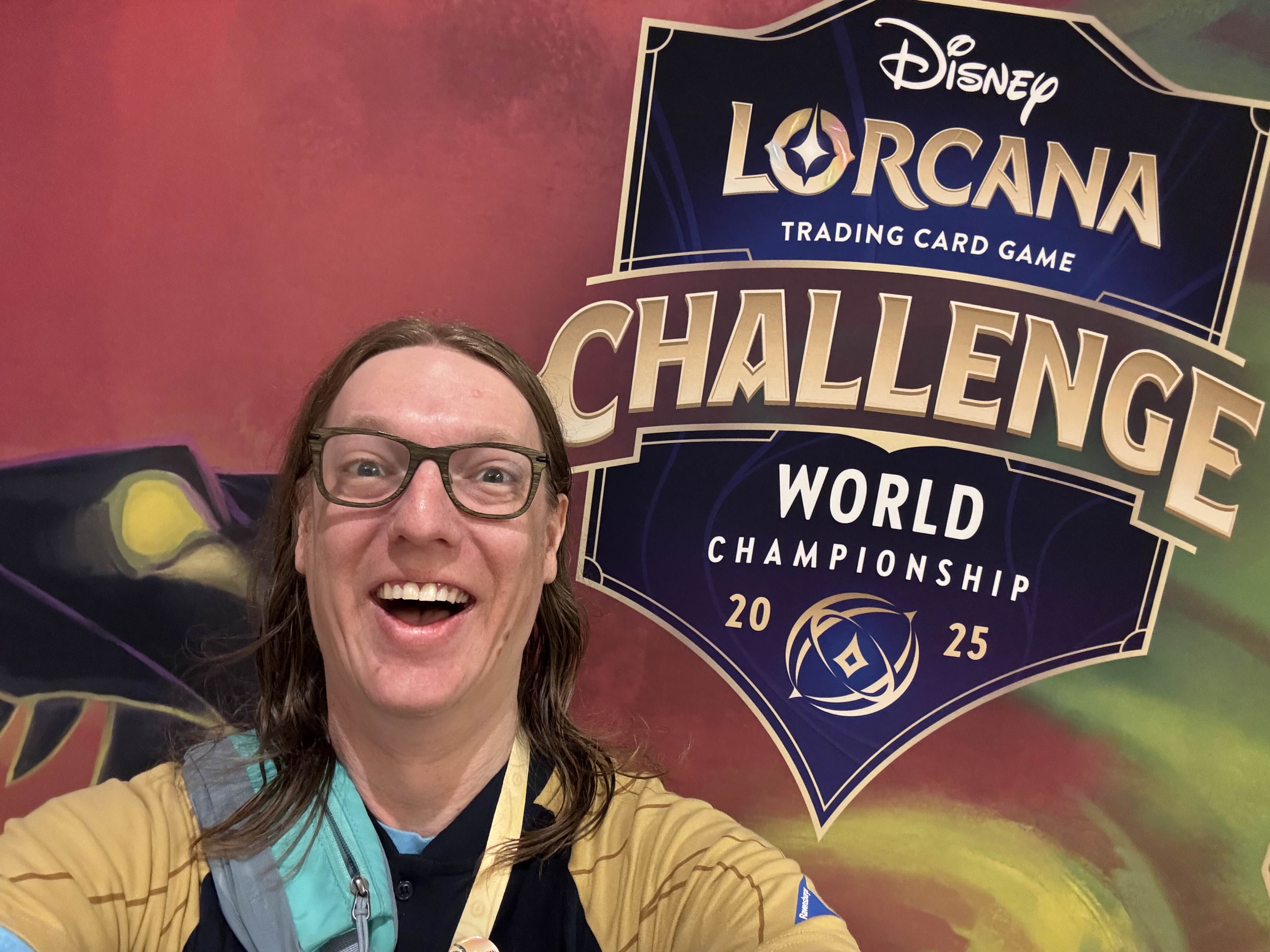
Hello! Welcome to my first ever tournament report! I decided (far too late in the weekend) to write this for two main reasons: firstly, to create a record and reflection of my experience of the event for my own growth as a judge; and secondly, to provide other judges and interested parties with a glimpse behind the curtain of this very small, unique tournament. So without further ado, let’s launch into the events of the weekend!
Day One: Media Day
Look at This Family
While I had worked with many of the North American judges present at Worlds at previous Disney Lorcana Challenges (DLCs), I had not met any of the European judges in person. Going into this weekend, I had some misgivings about this aspect of the crew–what if we did not vibe well together? Team dynamics can have a huge impact on a small staff, and that was all up in the air at the start of the most high-stakes event I had ever worked.
Luckily, those misgivings were completely unfounded. We very quickly fell into comfortable working relationships, with everyone’s professionalism and competence on full display. And, of course, as we eased into knowing each other a little better, a genuine camaraderie developed. I could not have asked for a better group of judges to spend the weekend with.
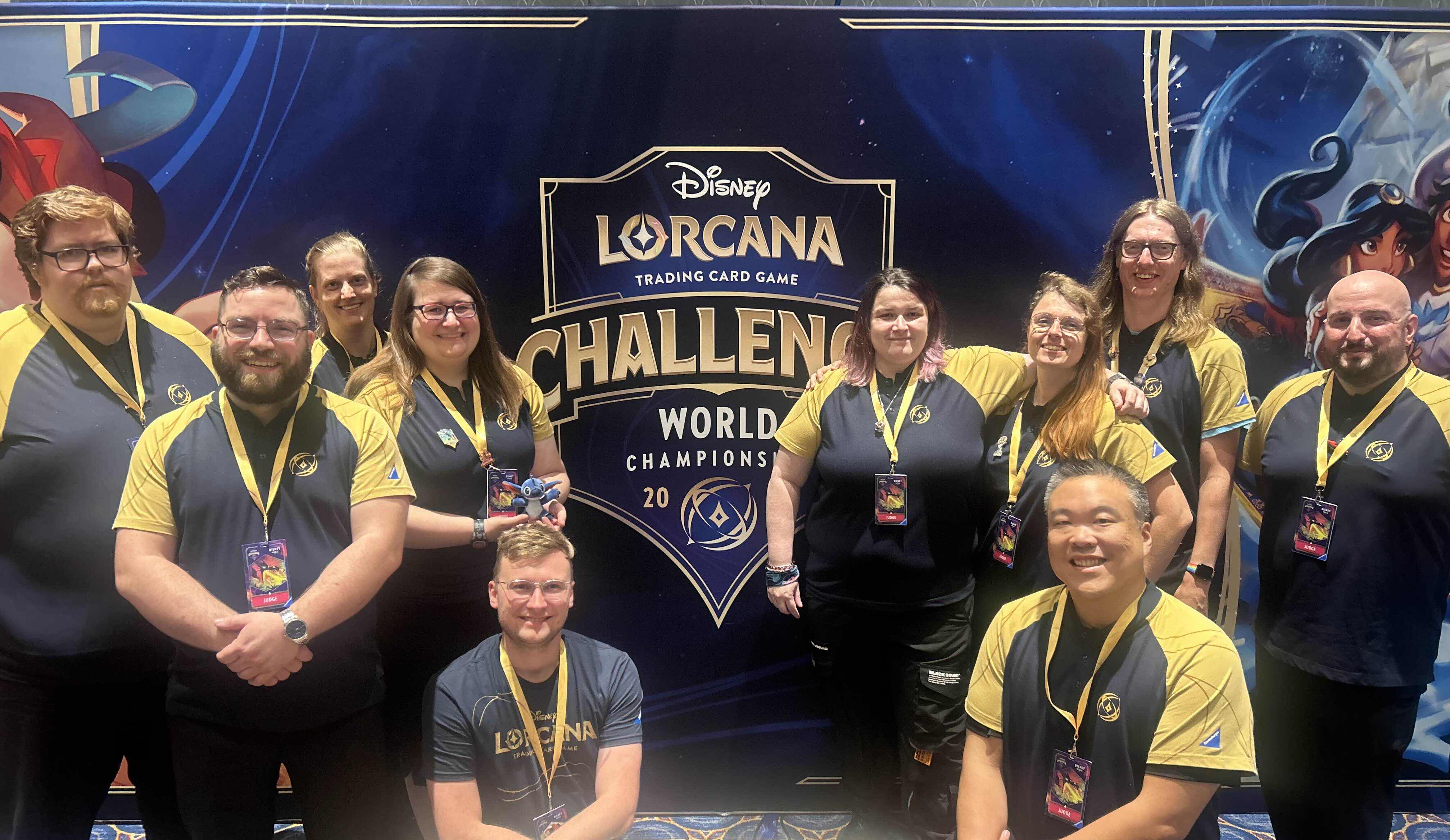 The Dream Team!
The Dream Team!
Boss’s Orders
One very stark difference between the European DLCs and the North American DLCs was the handling of rewinds (reverting the game state to the point of a player’s error). This was predominantly relevant in cases where a player made an invalid choice while resolving an Action card.
In NA DLCs, judges were directed by their Tournament Organizer to apply the strict letter of the rules when rewinding this error, considering the Action legally played and requiring the player to make a legal choice while resolving the effect. I myself had to enforce this rule on stream at DLC Toronto in the third game of a tense Top 32 match where We Don’t Talk About Bruno was played, with the competitor choosing their opponent’s The Muses for its effect. That player was required to choose one of their own characters instead (their own The Muses), as the opponent had nothing else in play.
Conversely, in the EU, judges were directed to allow players to rewind the game state back to the point where the player was deciding to play the Action in the first place. This is obviously a much more forgiving approach, and the disparity was something our international team had immediate questions about for this event.
It was deeply reassuring to hear from the Head Judges (HJs) that they had been considering this question before the event, and had gone over expectations with Ravensburger and Fanfinity (the Tournament Organizer). It had been decided that the best course of action for Worlds was to respect “the intent of the player” and use the EU standard of rewinding to before the Action card was played, although the ability to rewind was not delegated for this event (as was often the case at the NA DLCs) and remained solely the responsibility of the Head Judges.
Swing Into Action
The Super Sealed format at this event required sixteen packs across four sets for each of twenty-eight players, for a total of four hundred and forty-eight packs that needed opening and cataloging. Why cataloging? Each player was to be provided with the full list of every card in their pool to facilitate their deck creation, the ability of their opponent to review their deck/sideboard, and the deck-check procedure.
This was no small task, with each set of packs having to be opened, sorted, and recorded, and several cards were tracked incorrectly along the way. However, due to the way we had set up the procedure, every single one of those mistakes was found and corrected before players ever laid eyes on their cards. It was a labor-intensive activity for sure and not terribly fun, but I was very impressed by the forethought that Fanfinity and the HJs had put into the process. If Super Sealed shows up in future events, I feel completely prepared to handle pool registration!
And we pulled several enchanted cards, which is always nice!
Treasures Untold
Another conundrum that the Head Judges faced was how to distribute the Super Sealed cards. Their goals were threefold - to ensure that no player had any information about which cards they would get, to ensure that no staff member had any information about which cards a player would get, and to make both of those things very obvious to everyone involved.
In order to do that, once every list had been checked and rechecked by several different judges, we sealed up all the cards inside the boxes the original booster packs came from. The printed lists of cards were included with the pools, but not visible until the seal was broken. These boxes were then mixed up and laid out randomly on a single table.
As the players entered the room, they were instructed to quickly grab a box from the display and move to their first seating where they waited to get the go ahead to unseal their box.
I think this kind of “analogue” randomization was a great solution for the task at hand and adequately addressed all of the three main goals. One improvement I could see being implemented would be to provide the pools in identical boxes just for one additional step of making all the pools totally indistinguishable. Also, I’m not sure how well this method would scale for larger events!
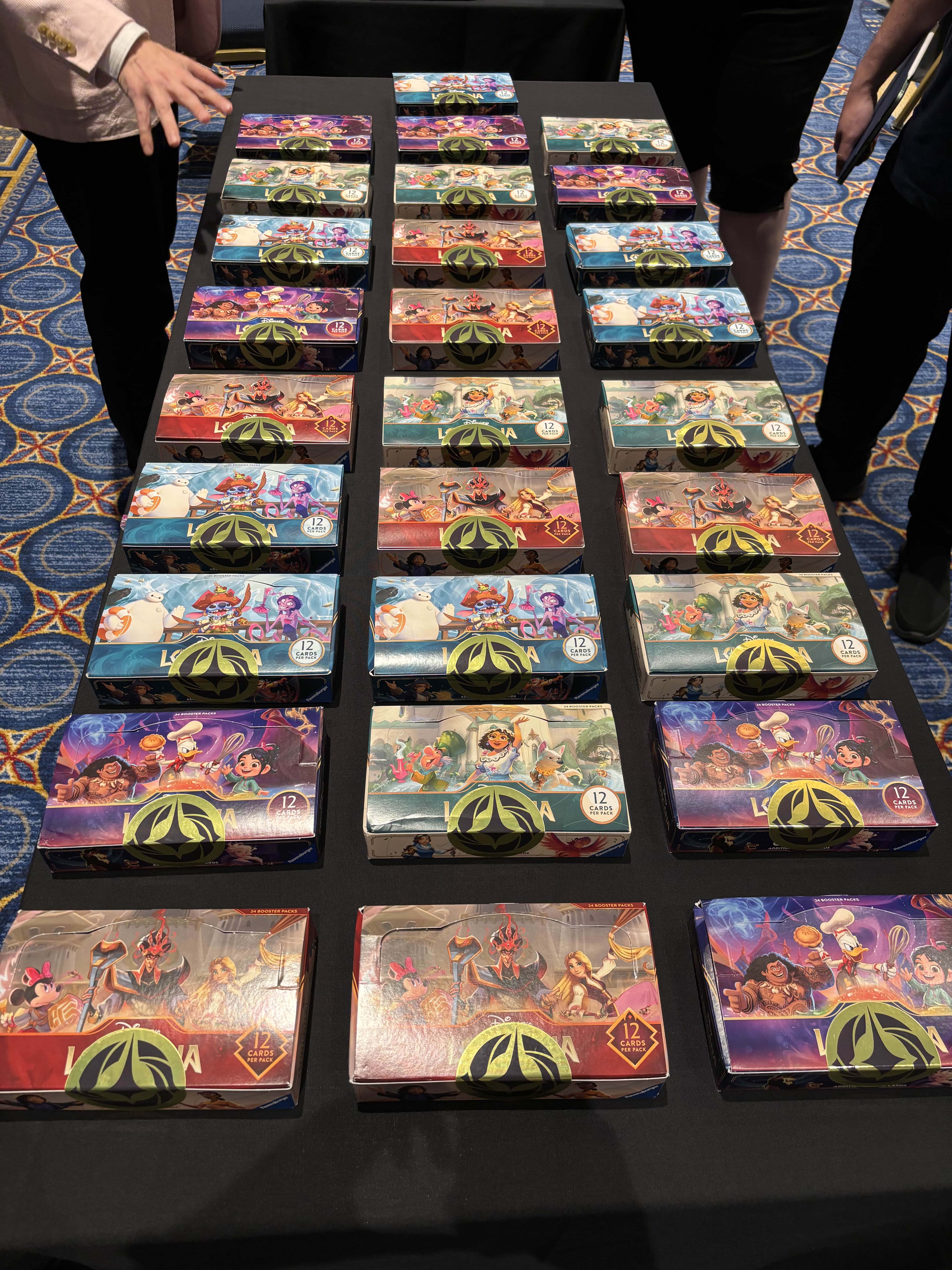 The Super Sealed pools, arranged before players arrived. Which would you have picked?
The Super Sealed pools, arranged before players arrived. Which would you have picked?
Day Two: Super Sealed and Triple-Deck
I Will Find My Way
Launching the first ever Disney Lorcana World Championship with not one, but two brand-new formats was an absolutely terrifying proposition for me. My judging experience outside of Disney Lorcana is slim to none, and even within the game my experience with Limited formats is, well… limited. I was excited about the possibility of previously unseen card interactions, and terrified of the possibility of previously unseen rules infractions. Did we have a plan for handling accidental failures to un-sideboard between rounds? Did we have a plan for mishaps when revealing benched ink pairings?
Yes, of course we did! Once again, I was deeply impressed by the attention to detail that went into preparing for this event and by the time I was settling into the stream desk, my fears were mostly allayed. I still had some outstanding questions, but they ultimately turned out not to be relevant. In retrospect, I could have pushed harder to make myself clear during judge meetings and will endeavor to do so in the future, in order to avoid being left with niggling questions going into the event.
Zero to Hero
Let’s talk about scheduling! First of all, I want to briefly address the changes to the stream’s start time: this was not affected by the event itself! We began the event exactly on time and our day proceeded very cleanly. Some rounds even ended ahead of schedule!
I was initially put on the stream/coverage team for just the Super Sealed portion of the event, winning the die roll to start in the main spot monitoring the camera feed before rotating through the other roles. This was an incredible experience, moving the “table judge” away from the actual table and into a private viewing area. I was able to confer with colleagues without disturbing the players, and I did not have to worry about keeping a poker face the whole time.
However, this also came with a learning curve! I had to step up my professionalism in how I interacted with players over the headset, as well as polish my ability to give clear, concise, and comprehensive instructions to players when getting them set up to be a feature match. While this was challenging, it was also very rewarding to feel the improvement over the course of the event. I would have liked to have spent more time preparing for this role on the Media Day (or before), but that was not possible due to time and scheduling restraints.
In light of that learning curve, the schedule ended up being changed to keep the same team on features all day. This definitely had benefits–mainly allowing myself and the other judges to really nail the procedural aspects of their roles and work out any kinks–but it did deprive the other judges of a chance to participate in the broadcast on Day 1. I believe this was to the overall benefit of the event, but could have been planned beforehand to be more considerate of staff expectations.
Desperate Plan

I was present for this call, but not the responding judge. I did not take notes at the time, so I have substituted the specific card from the call with a card that has an equivalent ability. Another floor judge took a call from a player asking if they could resolve a trigger from Maurice’s Workshop after playing an item and then a character. The judge ruled that, since the triggered ability is a “may” effect, they had missed their chance to resolve it. The player asked whether that was in line with “the recent changes to missed trigger rulings”, at which point the responding judge looked towards me. I don’t believe they needed any assistance at this point and absolutely knew that there had been no update, but I did shake my head to indicate that no such rule change had been made. The judge reaffirmed their ruling to the player, at which point they decided to appeal to the Head Judge to review the ruling.
I’m not sure if my involvement influenced the players decision to appeal, but on reflection I feel like it may have looked like I was disagreeing with the ruling or given the impression that the responding judge was unsure. While I think having two judges present at a call can be useful, I didn’t really fulfill that role effectively here.
Double Trouble
Above, I mentioned that I think having two judges attend a call is often useful and I would like to talk about that a little bit for any players or judges who think that is maybe a little over-the-top.
Firstly, and most obviously, having two judges basically doubles the chance that you’re going to see a correct resolution to the call. While an individual judge may have gaps in their knowledge that a particular card interaction would fall into, adding a second judge can drastically reduce the chance that this will present an issue.
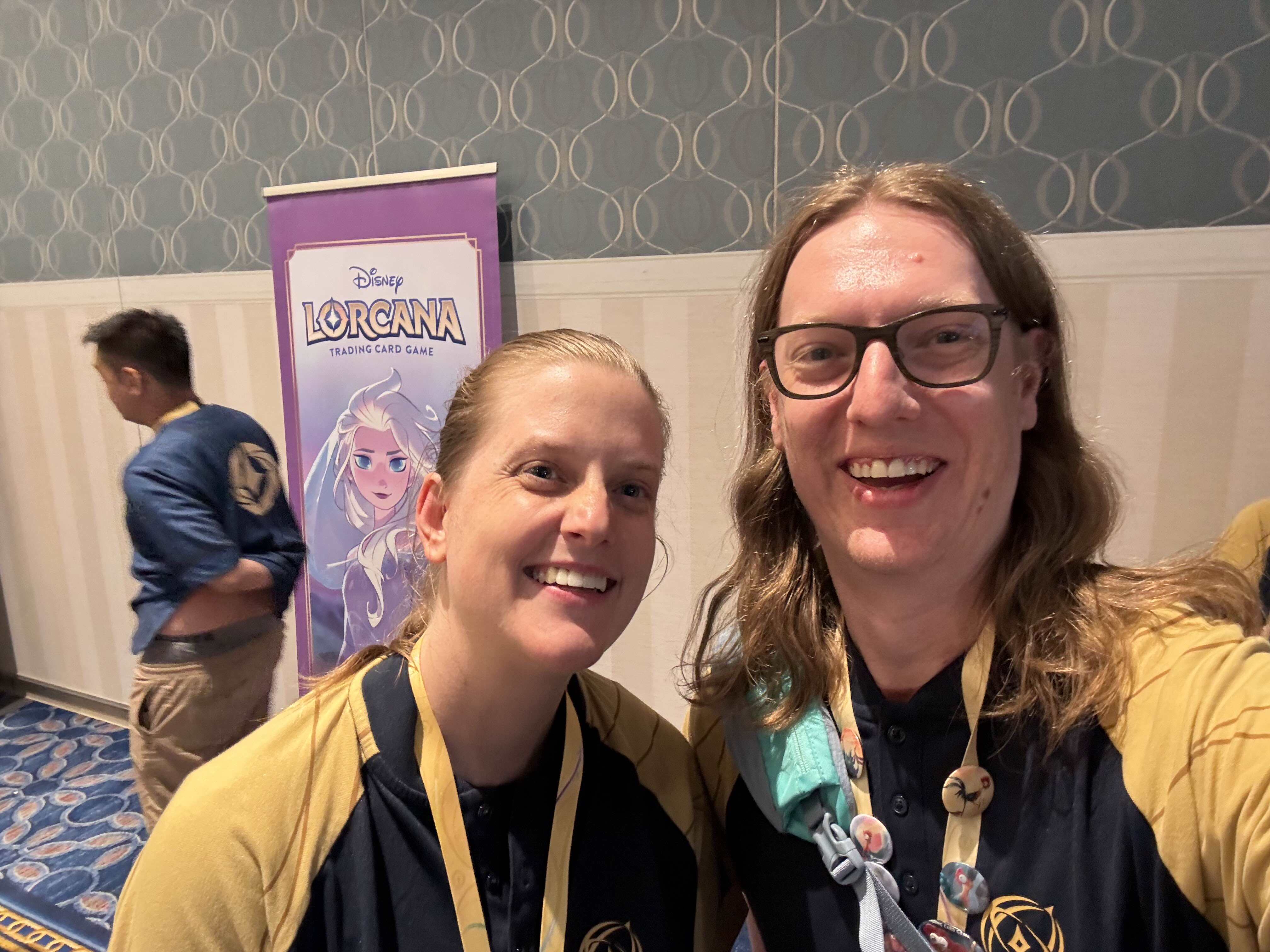
Secondly, having a second judge present can reduce the time a call takes and get players back to playing much more quickly. The second judge can be looking up rulings and play corrections for verification while the responding judge talks to players. They can fetch a Head Judge for clarifications or appeals without the responding judge having to call for someone else to watch the table. This extra efficiency is important for both the experience of the players involved, and for the tournament as a whole. No one likes waiting around for that 30-minute time extension to pass by!
Thirdly, two judges that attended the same call are able to give each other direct feedback. While self-reflection is an essential part of your growth as a judge, there is often no substitute for the input of a colleague who has seen you in action. Better judges benefit everyone! In short, remember that a judge’s main role is to help maintain the integrity of the tournament by assisting players with any issues that arise. Being able to do that with more than one judge present offers a lot of benefits where the structure of the event can support it!
Day Three: Triple-Deck Top Cut
Gathering Knowledge and Wisdom
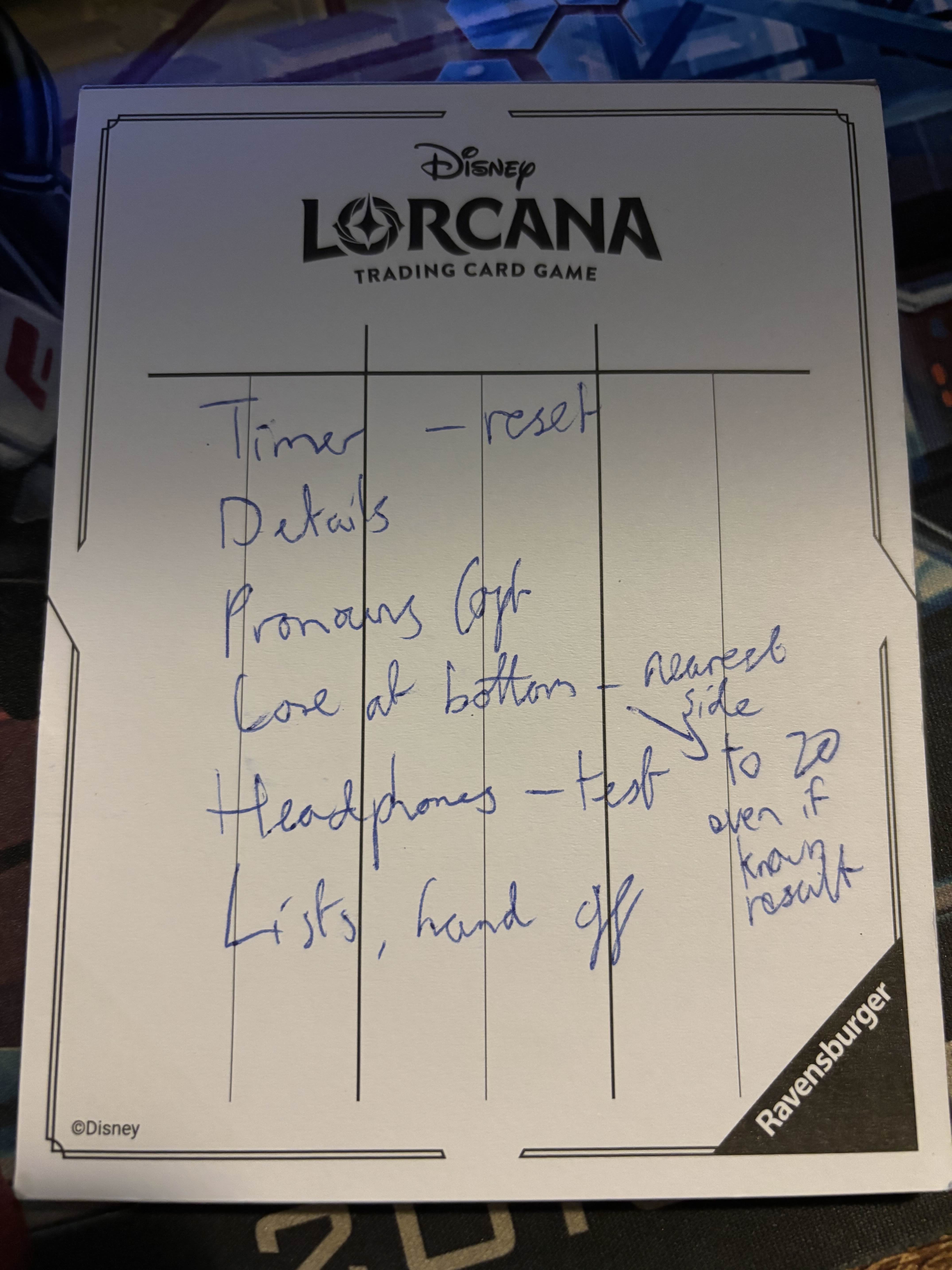
Having spent all of the previous day working the stream, I was asked by the HJs to help prepare the rest of the team for running the top cut broadcast. If I’m honest, I didn’t have a lot to add to what the HJ who was leading the meeting said, but I had a few additional nuggets of wisdom to share. I was glad that I had made some notes on Saturday to help myself nail down the language I was using to guide players and make sure I didn’t miss anything, as I was able to use those to pass on the best-practices I had developed. If I’ve learned anything from Worlds, it’s almost certainly to take more notes!
There were a few minor scheduling issues on Sunday, where the judge team pivoted to ensure we had an active stream judge who could interpret and facilitate players in their preferred native language. I would have liked to see that be considered when making the schedule originally, especially for the known pairings in the first half of the day. Definitely something to remember for future multi-language events.
One Jump Ahead
Game 1 of the Finals saw a Genie - Wish Fulfilled go questing on the turn he was played. And I missed it. I don’t know whether I was distracted by something happening backstage, but I did not catch that the Genie was not able to quest. Luckily, I was not judging the event alone, and the error was caught by another judge, Phil, on the roaming headset who was watching from the floor.
The reason that the error took so long to correct was that Phil was waiting to see if I handled it–he was unable to hear if I was talking to the players over his headset channel, so had to observe the stream to determine if I was intervening. This inability to hear fellow judges over the player feed was something that caused a few issues over the weekend, and is definitely something I will see if we can address when I am involved with future broadcasts.
In addition, I am not happy with the way I handled the error. Instead of rewinding the game state, as required by the Play Corrections Guide (PCG) and which would have been very complicated due to the actions taken in between the error taking place and stopping the game to address it, I had the player who quested ready the Genie and deduct the lore from their total. This deviation was approved by the HJ present in the stream area with me, but I still feel like I rushed the call due to how late I stopped play. I hope this serves as an example for how the PCG would benefit from having an allowance for partial fixes added in the future, but for now it will serve as a reminder for me to slow down.
You Came Back
Many readers may be aware of the mistake the eventual champion, DKP, made in Game 3 of the Finals, mistakenly choosing to damage Rhino - Power Hamster with a Fire the Cannons before challenging with Pete - Games Referee. Taking these actions in that order results in Fire the Cannons dealing no damage (due to the Resist +2 effect) and Pete only dealing one damage to Rhino, whereas reversing the order would have banished him–clearly the intent of the play.
When the opponent called for judge intervention, I believe it was to avoid any hard feelings over having to refuse to allow a take-back over a clear mistake. I don’t believe either player would take such a thing personally, but it is part of my responsibility as a judge to clarify these sorts of ambiguities according to the rules and relieve players of any social pressure to deviate from those rules. There was no rules violation here, and play continued.
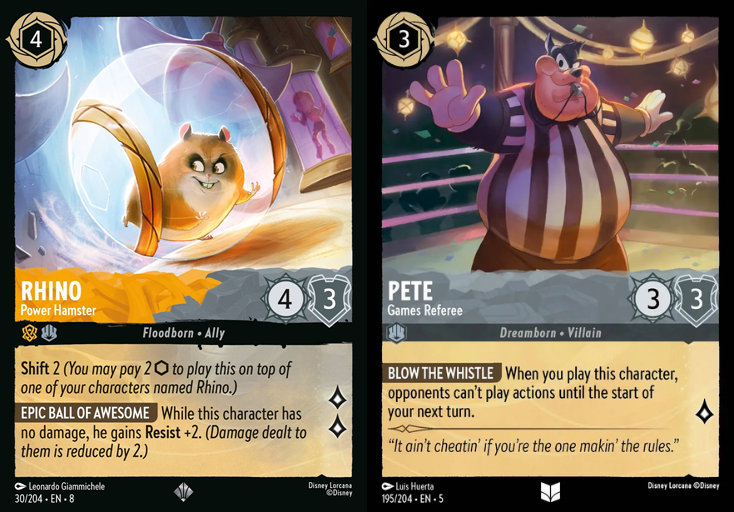
Day Four: Bonus Day
Everybody Has a Weakness
Not really a part of the tournament report, but I did just want to let everyone know that I finally got a chance to play Head Judge Imogen’s Disney Lorcana Judge Tower the Monday after the event, and…
I was the first one out! I’m looking forward to practicing enough to polish up my own actual play and get my name on the Good Job! prize card!
Final Thoughts
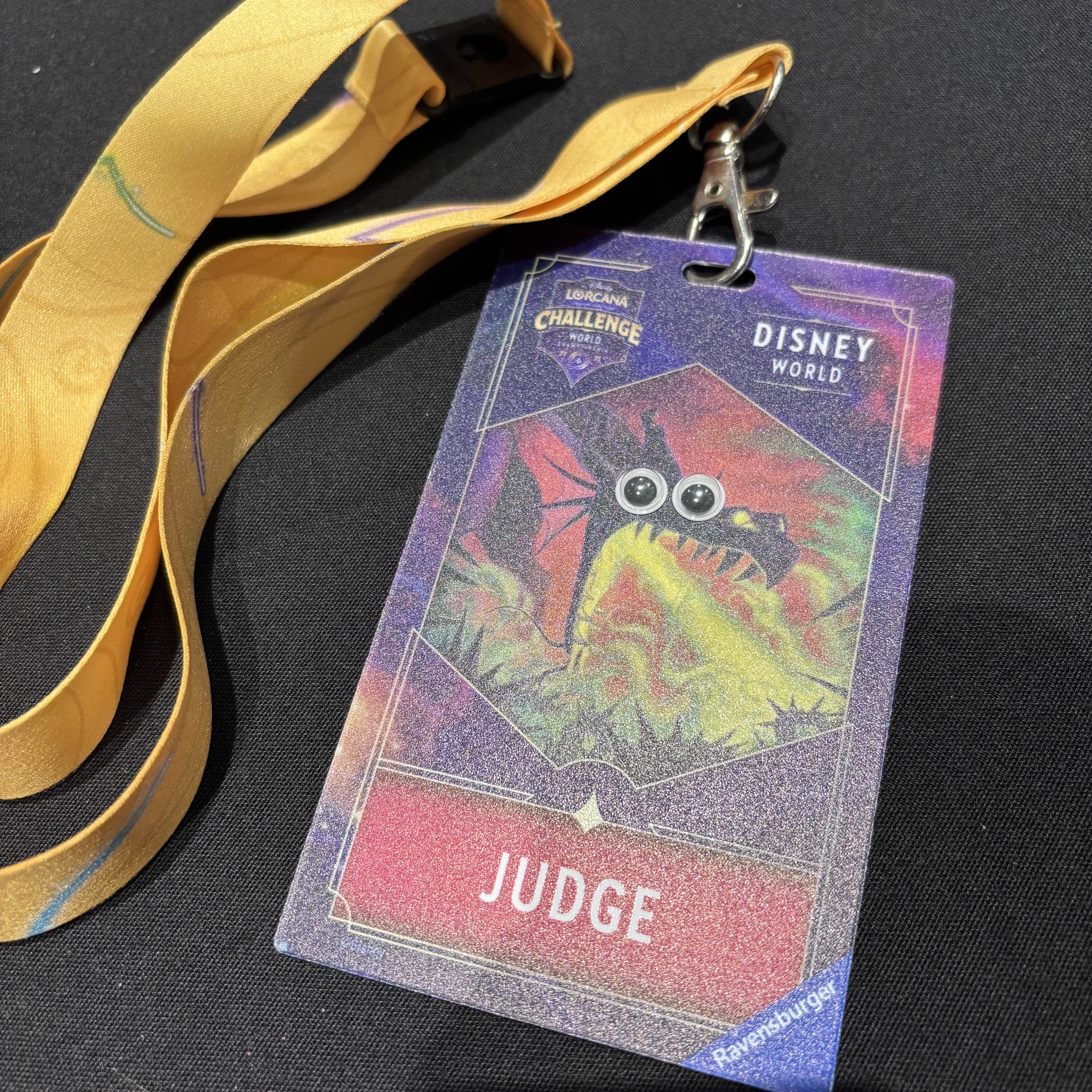 I had to do it, didn’t I?
I had to do it, didn’t I?
Beyond the Horizon
- While some procedural hiccups were encountered, they were all handled effectively by the team and did not impact player experience or tournament integrity.
- I need to take more notes. Especially if I plan to continue making tournament reports!
- I could be more aware of my interactions with other judges while around players in order to avoid creating misunderstandings, as well as having more confidence in my choices while around senior staff.
- My comfort level with handling customer-service-oriented tasks is improving rapidly, and I am very pleased with the progress I made in this area over the course of the event, particularly in the Feature Match roles.
- Using your team’s strengths where they are most effective will make for a smoother event than trying to accommodate everyone taking on every role. Experience is meaningful!